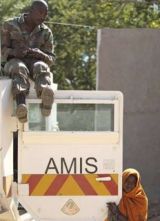World powerless to stop Darfur’s killing and carnage
December 25, 2007 (KHARTOUM) — Diplomatic wrangling dashed hopes for an end to the killing and rape in Darfur this year and a new UN-backed peacekeeping mission scheduled to start on January 1 faces an uphill struggle.
 UN Darfur envoy Jan Eliasson and his African Union counterpart Salim Ahmed Salim have had scant success trying to revive and broaden a peace deal reached last year between the Khartoum government and rebel groups in the strife-torn region of western Sudan.
UN Darfur envoy Jan Eliasson and his African Union counterpart Salim Ahmed Salim have had scant success trying to revive and broaden a peace deal reached last year between the Khartoum government and rebel groups in the strife-torn region of western Sudan.
There has been no end to the violence — which the United States calls “genocide” — and both sides are still blaming each other for the carnage and destruction that began in February 2003.
The combined effects of war and famine have killed at least 200,000 people with more than two million displaced, according to UN estimates.
UN and AU-mediated talks in the Libyan city of Sirte in October, aimed at persuading Darfur rebel leaders to join peace negotiations, got nowhere because the main rebel groups boycotted the event.
But the two envoys have vowed to keep pushing for a political solution despite the fragmentation of rebel groups and the continuing violence.
Two main rebel groups, the Justice and Equality Movement (JEM) headed by Khalil Ibrahim, and a faction of the Sudan Liberation Movement (SLM) headed by Abdel Wahid Nur, continue to reject negotiations with Khartoum until security is improved in Darfur.
Khartoum says its forces have observed a ceasefire since October. However, UN experts and independent bodies insist the violence is raging on.
“Violence is again increasing, access for humanitarian agencies is decreasing, international peacekeeping is not yet effective and a political settlement remains far off,” said the International Crisis Group (ICG), a private conflict resolution organisation, in a recent report on Darfur.
The war broke out in February 2003 when rebels rose up against Khartoum to demand an end to the political and economic marginalisation of their region.
Sudanese President Omar al-Beshir’s government responded by giving the feared Janjaweed militia free rein to crack down on the rebels and their backers. The militia has been blamed for much of the killing, rape and wholesale destruction of villages.
A peace deal was signed with the government in the Nigerian capital of Abuja in May 2006 but only one rebel faction endorsed it. The divisions sparked a new surge in violence.
Darfur rebel groups have splintered into dozens of factions while the violence has hindered effective humanitarian help for the people who remain.
A report by UN experts published on December 6 said Sudanese forces continue to kill civilians in Darfur and that all sides in the conflict still abuse human rights with impunity.
UN Under Secretary General for Humanitarian Affairs John Holmes said during a recent visit to Khartoum that 4.2 million of Darfur’s six-million-strong population had been affected by the conflict.
Around 2.2 million people have been displaced, including 600,000 who have fled their homes since the Abuja peace deal was signed a year and a half ago.
According to Holmes, 270,000 people were displaced this year alone.
The international community has agreed to replace the 7,000 overstretched African Union troops in Darfur with a joint AU-UN force of 26,000, making it the UN’s biggest peacekeeping mission.
On July 31, UN resolution 1769 authorised the joint force for what the UN leadership has called the world’s biggest current humanitarian catastrophe.
Sudan reluctantly agreed to the deployment but wants to see African troops on its soil rather than UN blue helmets.
The deployment of the force, known as UNAMID, is running several months behind schedule and its prospects of success are in peril because of a lack of equipment, UN Secretary General Ban Ki-moon has warned.
Only a third of its eventual strength is likely to be in place on time when the mandate starts on January 1, according to its commander General Martin Luther Agwai.
The best-case scenario would see 9,000 personnel on the ground on January 1, but that will include the 6,200 AU troops already in Darfur, he said.
The United Nations has voiced its disappointment that obstacles placed by Khartoum are delaying the mission.
Underlining the world’s inability to stem the violence, Washington on Friday announced the resignation of its special envoy for Sudan, Andrew Natsios, who cited limits on “the ability of the international community to put back together a country that has got very very serious problems.
“We can help in the process, we can push people, we can apply pressure of various kinds… but the reality is ultimately who is going to save Sudan is the Sudanese themselves.”
(AFP)
